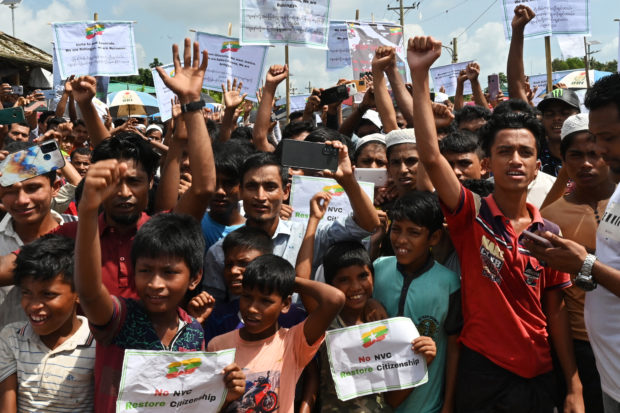Myanmar Rohingya ‘without dreams’ five year after crackdown

Rohingya refugees shout slogans during a “Genocide Remembrance Day” rally marking the 5th anniversary since fleeing Myanmar from a military offensive, at a refugee camp in Ukhia on August 25, 2022. AFP
YANGON — After his mother begged him to stay, Maung Soe Naing decided not to join his fellow Rohingya fleeing into Bangladesh to escape a brutal crackdown by Myanmar’s military five years ago.
He still lives where he calls home but is trapped there by onerous restrictions on movement.
He has all but stopped planning for the future, slowly letting his house go to ruin.
The 2017 military campaign drove more than 740,000 refugees into neighbouring Bangladesh, bringing reports of murder, arson and rape in a crackdown the United States has since said constituted genocide.
Roughly 600,000 Rohingya who remain in Myanmar are either housed in camps after being displaced in previous shocks of violence, or live a precarious existence in their villages at the mercy of military and border guards.
Most are denied citizenship and subject to restrictions on movement, their health care and education — treatment that Human Rights Watch has said amounts to “apartheid”.
Maung Soe Naing was working away from home when soldiers and ethnic Rakhine Buddhists began rampaging through Rohingya villages in response to attacks carried out by Rohingya insurgents on August 25, 2017.
“I couldn’t even stand still because of the fear,” he told AFP, using a pseudonym because of the risk of reprisal attacks for speaking to international media.
A Rakhine friend helped him hide from security forces and wait out the rampaging mobs before he was reunited with his mother a month later.
“I stayed for my mother because she was crying on the phone in fear she wouldn’t be able to see me in the future if I fled,” he said.
Any hopes that life would improve after the violence have been dashed.
Authorities have “limited our movement more than before and job opportunities and connections have been cut off”, he said.
“After 2017, we have so many tragic stories… it becomes like a burden.”
He stopped making repairs to his house each rainy season for fear that it could be lost in another crackdown, he said.
“We don’t have a future.”
‘We can’t just leave’
Zarni Soe, a 22-year-old Rohingya from northern Rakhine, also braved out the bloodshed in the hope he could find some semblance of normality in his home afterwards.
He later passed his high-school exams but was blocked from attending university in the state.
“We are restricted in every aspect of our life,” he said.
Access to specialised and emergency care for Rohingya living in camps in central Rakhine is “extremely limited”, said Marjan Besuijen, head of mission for Medecins Sans Frontieres (MSF) in Myanmar.
“Even when MSF patients need emergency care, some are reluctant to go after hearing stories of discrimination and mistreatment Rohingya have endured in the facilities,” she said.
Maung Soe Naing said the Rohingya “always think about leaving this country”.
“But at the same time, we can’t just leave because they arrest us and stop us from traveling.”
Myanmar’s security climate worsened in February last year when the military staged a coup, ousting the civilian government and later waging a bloody crackdown on dissent.
Since the coup security forces have arrested an estimated 2,000 Rohingya including hundreds of children for “unauthorized travel”, according to Human Rights Watch.
Muslim-majority Malaysia is often the destination of choice for those trying to leave Myanmar. Many take their chances with traffickers on dangerous journeys over land or on perilous boat trips lasting months over tropical seas.
In May, the bodies of 14 people washed up on a beach in southwest Myanmar, with the UN’s refugee agency saying it feared they were Rohingya.
‘People without dreams’
The return to military rule last year has further dimmed hopes for any path to citizenship or easing of current restrictions.
The junta’s crackdown on dissent has “exacerbated the worsening humanitarian situation, particularly for ethnic and religious minority communities, including Rohingya”, US Secretary of State Antony Blinken said on Wednesday.
The group “remain among the most vulnerable and marginalized populations in the country”, he added.
Junta chief Min Aung Hlaing — who was head of the armed forces during the 2017 crackdown — has dismissed the Rohingya identity as “imaginary”.
For those in the camps, even going home is unlikely, said Besuijen of MSF.
“Even if they were able to move, many villages and communities in which they used to live no longer exist,” she said.
“We don’t have a future or hope in this country where there is very deep racial hatred against us,” said Maung Soe Naing.
“We want to live in dignity and with a standard of living like others,” said Zarni Soe.
“But we are living our life like people without dreams.”
RELATED STORIES
Songs of praise: Rohingya sing Myanmar anthem 5 years after exodus
Rohingya refugees in India’s capital to be given flats, security
India to begin deportations of Rohingya Muslims to Myanmar
COVID-19 And The Rohingya: Hunger, exploitation, hate crimes and xenophobia